Saturday, July 08, 2006
How #*$&! cynical can you get
Damn, I think I see through a lot of the BS in this world. After all its not like I was born yesterday and I've seen a lot of the tricks and non-sense that the powers that be offer up. So I like to think not a lot surprises me.
But sometimes there is stuff that is just so godam fucking cynical (sorry for the language but right now I just can't help myself) it takes your breath away. When Fox came into office in Mexico he promised to bring to justice those who had oppressed and violated the human rights of Mexicans under the previous quasi dictatorship. Of course, that was just one more promise he never fullfilled. But given that there was an election to be won they had to do something. So they put under house arrest (or is that "mansion arrest") former president Echeverria who was behind the 1968 slaughter of protesting students. Of course, this all happened two days before the election. How coincidental.
Anyways, the cynicism doesn't end there. Given the election is over and so is the need for the charade today a judge cleared Echeverria of all charges on the grounds that the statute of limitations had passed. But of course, who could have known a week ago when they needed a pre-election stunt that the satute of limitations had expired?
For the past couple of weeks I have been reading all about how great the new and independent institutions of Mexico are now - not the least of which is the electoral authority, IFE. As this shows, what a crock. More and more I'm starting to think AMLO shouldn't give them a minute of piece until they count the ballots.
|
But sometimes there is stuff that is just so godam fucking cynical (sorry for the language but right now I just can't help myself) it takes your breath away. When Fox came into office in Mexico he promised to bring to justice those who had oppressed and violated the human rights of Mexicans under the previous quasi dictatorship. Of course, that was just one more promise he never fullfilled. But given that there was an election to be won they had to do something. So they put under house arrest (or is that "mansion arrest") former president Echeverria who was behind the 1968 slaughter of protesting students. Of course, this all happened two days before the election. How coincidental.
Anyways, the cynicism doesn't end there. Given the election is over and so is the need for the charade today a judge cleared Echeverria of all charges on the grounds that the statute of limitations had passed. But of course, who could have known a week ago when they needed a pre-election stunt that the satute of limitations had expired?
For the past couple of weeks I have been reading all about how great the new and independent institutions of Mexico are now - not the least of which is the electoral authority, IFE. As this shows, what a crock. More and more I'm starting to think AMLO shouldn't give them a minute of piece until they count the ballots.
|
While Venezuela booms the opposition suffers a meltdown
The long economic boom in Venezuela continues seemingly unabated. It was reported today that the unemployment rate has fallen to 9.7% in June 2006 from 11.8% in June 2005. Also in the past 12 months 488,387 new jobs have been created. 275,839 of those new jobs have been in the formal sector (which is defined as working for companies with more than 5 employees or self-employed professionals) while 210,251 were created in the informal sector [note the numbers don't add up but I took this from El Universal newspaper so what can you expect]. So clearly the job market in Venezuela is improving dramatically.
By way of comparison between May of 2005 and May of 2006 the U.S. economy generated only 2.4 million new jobs. Given that the U.S. has 12 times the population that Venezuela has Venezuela's new job growth would be the equivalent of 5.8 million new jobs in the U.S. (488,387 x 12). So Venezuela is creating new jobs at two and a half times the rate of the U.S.
And what are all the Venezuelans who now have jobs doing with their money? In part, they are buying cars. It was announced today that new car sales in June were up 38% over the same month last year. For the first six months of 2006 car sales are up 44.2% over a year ago to a stunning 140,517 cars sold. No wonder traffic jams are starting to get out of hand in Venezuela.
While all of this is of course good news for Venezuela, for the Venezuelan opposition it is bad news. Hence their meltdown yesterday. One of the guiding lights of the opposition, Teodoro Petkoff, announced he wouldn't participate in the primaries being promoted by opposition NGO Sumate. But not just that. He accused Sumate of acting in an arrogant and high handed manner and imposing conditions on would-be candidates. He said their arrogant and dictatorial ways were comparable to the "Dictator for a Day" Pedro Carmona!!!! Gee Teo, welcome to the club. Now maybe you and former CNE president Jorge Rodriguez can go out for drinks and commiserate about what dishonest and arrogant slime Sumate is!! It sure took Petkoff a long time to wake up but I suppose better late than never.
Meanwhile Sumate has announced that it will hold primaries on August 13th for whatever candidates might still be interested in participating in them. Should be interesting to see how many people show up for that! Maybe as a way of getting half way decent turnout Sumate should set up the voting centers in automobile showrooms.
|
By way of comparison between May of 2005 and May of 2006 the U.S. economy generated only 2.4 million new jobs. Given that the U.S. has 12 times the population that Venezuela has Venezuela's new job growth would be the equivalent of 5.8 million new jobs in the U.S. (488,387 x 12). So Venezuela is creating new jobs at two and a half times the rate of the U.S.
And what are all the Venezuelans who now have jobs doing with their money? In part, they are buying cars. It was announced today that new car sales in June were up 38% over the same month last year. For the first six months of 2006 car sales are up 44.2% over a year ago to a stunning 140,517 cars sold. No wonder traffic jams are starting to get out of hand in Venezuela.
While all of this is of course good news for Venezuela, for the Venezuelan opposition it is bad news. Hence their meltdown yesterday. One of the guiding lights of the opposition, Teodoro Petkoff, announced he wouldn't participate in the primaries being promoted by opposition NGO Sumate. But not just that. He accused Sumate of acting in an arrogant and high handed manner and imposing conditions on would-be candidates. He said their arrogant and dictatorial ways were comparable to the "Dictator for a Day" Pedro Carmona!!!! Gee Teo, welcome to the club. Now maybe you and former CNE president Jorge Rodriguez can go out for drinks and commiserate about what dishonest and arrogant slime Sumate is!! It sure took Petkoff a long time to wake up but I suppose better late than never.
Meanwhile Sumate has announced that it will hold primaries on August 13th for whatever candidates might still be interested in participating in them. Should be interesting to see how many people show up for that! Maybe as a way of getting half way decent turnout Sumate should set up the voting centers in automobile showrooms.
|
Thursday, July 06, 2006
The lessons of Mexico
Although it may not have fully played out yet I think now is an appropriate time to draw some conclusions from the just concluded elections in Mexico. Some of these lessons will be general in nature, and some will be specific to the Venezuelan situation.
Let me start off by saying the official results show Felipe Calderon having won the election. By a very narrow margin to be sure but at this time it looks unlikely to be overturned. And unless there was some pretty significant fraud, evidence of which has yet to be presented, it is probably the case that Calderon really did get more votes and is therefore the president elect. Mexico would have been a big victory for the left, no two ways about it. And given the fraud of the past god knows the left in Mexico deserved to finally catch a break. But it looks like that was not to be on this occasion.
So what lessons do I draw from this likely defeat? Here are some:
First: Skipping the first debate almost certainly made AMLO look arrogant and cost him support. If you are putting yourself forward in the political arena as a person who has ideas to make the country better than you should have no problem putting those ideas to the test in a debate with people who think differently. Skipping the debate makes you look like you are not confident in your ideas or not confident of your ability to articulate them well. Both make you look unfit for office and will cost you support. In this race which was ultimately so close that mistake by AMLO alone could have cost him the election
The decision was probably a cynical political decision made because at the time he was way ahead of his opponents. Yet what appeared to be a good tactical move at the time proved fatal in the end. The moral of this is to do what is right, in this case willingly debate your opponent, and you will probably be better off in the end no matter what the twists and turns of the campaign are. Chavez may be 20 or 30 points ahead in the polls. But no matter. If the opposition decides to run in the elections then he should agree to debate whoever their candidates are.
Second: If you think that there are mistakes or fraud in an electoral process and want to make expose them make sure you have your ducks lined up first. AMLO came out on the night of the election saying that his count of the tally sheets (actas) showed him winning the election in spite of the official tally showing him losing. That would all be well and good - if he had actually had the tally sheets and if they truly did add up to show him winning. Yet it now appears that the tally sheets confirm that the PAN got more votes (whether or not the tally sheets are accurate is another question) as the new official count still shows PAN ahead and AMLO no longer seems to be contesting the total of the tally sheets. This confirms what the PAN had been saying all along, that the tally sheets showed them winning, and makes AMLO look either dishonest or sufficiently inept to make serious public claims without bothering to get the numbers right. Not good.
The reason this is such a mistake is that your own credibility is vitally important. AMLO doesn't have the law on his side - getting a full recount of all ballots, which he wants, will require some exceptions to be made to existing Mexican laws. Now most people, no matter which side they support, are willing to be reasonable about this and agree that if there is doubt about the accuracy of the vote actions should be taken to remove those doubts. However, for them to take seriously AMLOs accusations and be convinced there really are doubts about who won people have to think AMLO is credible on this. Yet by having made false accusations about the tally sheets he makes it less likely people will trust him enough to now want to go along with his other requests. He simply looks dishonest and looks like he is seeking advantage for himself rather than simply wanting an accurate count of the ballots. Hopefully they will still do a full recount of the ballots but AMLO didn't make things any easier by not being very careful to be completely honest and accurate in his statements.
The lesson here is honest, accurate, and prudent in what you do and say. As it pertains to Venezuela this is really a lesson the opposition needs to learn. They have made so many false accusations regarding fraud and other things that if they happen upon real fraud its doubtful if anyone will actually believe them. Yet there may be times when the Chavistas need to keep this lesson in mind too. Credibility is too important and too hard to get to just through away easily.
Third: While paper balloting might seem the way to go for transparent elections it has its own problems that make it not an acceptable solution. The Mexican election shows several drawbacks to paper ballots. First, although the election was on Sunday fairly definitive results weren't available until Thursday morning. Although rapid returns can be viewed as just a matter of convenience in this day and age most people expect them.
But more importantly, paper voting does not necessarily provide accurate results. One has to assume that thousands of people across a whole country can be trusted to compute results and report them accurately. There is not guarantee the people doing the counting will act in good faith. And even if they do they can certainly make significant errors. As was reported in the New York Times today in one city where a reporter witnessed some actual recounts of ballots in every instance the recount showed the tally sheet totals were wrong - sometimes by hundreds of votes. This is clearly not something that should be acceptable.
Further, to reduce the possibility of fraud many countries with manual voting institute rules whereby if there are certain inaccuracies in the tally sheet it is discarded and none of its votes counted. For example, if the number of votes on the tally sheet add up to more than the limit of voters at a particular voting station they may discard all the votes. This is the famous "acta mata vota" (literally - "tally sheet kills votes") where by to make sure there aren't any bad votes counted you wipe out lots of probably good votes. This would not be acceptable to most people and is one of the reasons that the Venezuelan government prior to Chavez finally decided that voting needed to be automated. To me this clearly indicates that Venezuela needs to stay with its computerized voting system. Of course, that system needs to have appropriate safeguards and that will a be a subject of another post.
These are the three main lessons I draw from the Mexican vote. A bitter defeat to be sure, but if some of these important lessons can be learnt and internalized some good may still come of
|
Let me start off by saying the official results show Felipe Calderon having won the election. By a very narrow margin to be sure but at this time it looks unlikely to be overturned. And unless there was some pretty significant fraud, evidence of which has yet to be presented, it is probably the case that Calderon really did get more votes and is therefore the president elect. Mexico would have been a big victory for the left, no two ways about it. And given the fraud of the past god knows the left in Mexico deserved to finally catch a break. But it looks like that was not to be on this occasion.
So what lessons do I draw from this likely defeat? Here are some:
First: Skipping the first debate almost certainly made AMLO look arrogant and cost him support. If you are putting yourself forward in the political arena as a person who has ideas to make the country better than you should have no problem putting those ideas to the test in a debate with people who think differently. Skipping the debate makes you look like you are not confident in your ideas or not confident of your ability to articulate them well. Both make you look unfit for office and will cost you support. In this race which was ultimately so close that mistake by AMLO alone could have cost him the election
The decision was probably a cynical political decision made because at the time he was way ahead of his opponents. Yet what appeared to be a good tactical move at the time proved fatal in the end. The moral of this is to do what is right, in this case willingly debate your opponent, and you will probably be better off in the end no matter what the twists and turns of the campaign are. Chavez may be 20 or 30 points ahead in the polls. But no matter. If the opposition decides to run in the elections then he should agree to debate whoever their candidates are.
Second: If you think that there are mistakes or fraud in an electoral process and want to make expose them make sure you have your ducks lined up first. AMLO came out on the night of the election saying that his count of the tally sheets (actas) showed him winning the election in spite of the official tally showing him losing. That would all be well and good - if he had actually had the tally sheets and if they truly did add up to show him winning. Yet it now appears that the tally sheets confirm that the PAN got more votes (whether or not the tally sheets are accurate is another question) as the new official count still shows PAN ahead and AMLO no longer seems to be contesting the total of the tally sheets. This confirms what the PAN had been saying all along, that the tally sheets showed them winning, and makes AMLO look either dishonest or sufficiently inept to make serious public claims without bothering to get the numbers right. Not good.
The reason this is such a mistake is that your own credibility is vitally important. AMLO doesn't have the law on his side - getting a full recount of all ballots, which he wants, will require some exceptions to be made to existing Mexican laws. Now most people, no matter which side they support, are willing to be reasonable about this and agree that if there is doubt about the accuracy of the vote actions should be taken to remove those doubts. However, for them to take seriously AMLOs accusations and be convinced there really are doubts about who won people have to think AMLO is credible on this. Yet by having made false accusations about the tally sheets he makes it less likely people will trust him enough to now want to go along with his other requests. He simply looks dishonest and looks like he is seeking advantage for himself rather than simply wanting an accurate count of the ballots. Hopefully they will still do a full recount of the ballots but AMLO didn't make things any easier by not being very careful to be completely honest and accurate in his statements.
The lesson here is honest, accurate, and prudent in what you do and say. As it pertains to Venezuela this is really a lesson the opposition needs to learn. They have made so many false accusations regarding fraud and other things that if they happen upon real fraud its doubtful if anyone will actually believe them. Yet there may be times when the Chavistas need to keep this lesson in mind too. Credibility is too important and too hard to get to just through away easily.
Third: While paper balloting might seem the way to go for transparent elections it has its own problems that make it not an acceptable solution. The Mexican election shows several drawbacks to paper ballots. First, although the election was on Sunday fairly definitive results weren't available until Thursday morning. Although rapid returns can be viewed as just a matter of convenience in this day and age most people expect them.
But more importantly, paper voting does not necessarily provide accurate results. One has to assume that thousands of people across a whole country can be trusted to compute results and report them accurately. There is not guarantee the people doing the counting will act in good faith. And even if they do they can certainly make significant errors. As was reported in the New York Times today in one city where a reporter witnessed some actual recounts of ballots in every instance the recount showed the tally sheet totals were wrong - sometimes by hundreds of votes. This is clearly not something that should be acceptable.
Further, to reduce the possibility of fraud many countries with manual voting institute rules whereby if there are certain inaccuracies in the tally sheet it is discarded and none of its votes counted. For example, if the number of votes on the tally sheet add up to more than the limit of voters at a particular voting station they may discard all the votes. This is the famous "acta mata vota" (literally - "tally sheet kills votes") where by to make sure there aren't any bad votes counted you wipe out lots of probably good votes. This would not be acceptable to most people and is one of the reasons that the Venezuelan government prior to Chavez finally decided that voting needed to be automated. To me this clearly indicates that Venezuela needs to stay with its computerized voting system. Of course, that system needs to have appropriate safeguards and that will a be a subject of another post.
These are the three main lessons I draw from the Mexican vote. A bitter defeat to be sure, but if some of these important lessons can be learnt and internalized some good may still come of
|
Wednesday, July 05, 2006
Killer fact on Mexican election
The opposition likes to bitch and moan about how much money Venezuelan authorities have spent buying voting machines and the like.
Presumabely they could save money if they did things the old fashion way with pencil an paper like the Mexicans do. Well, not really. In today's Wall Street Journal it was reported the budget for the Mexican electoral authority, the IFE, this year was $1.2 billion dollars. Yes, that is correct, 1.2 BILLION DOLLARS. Damn, paper and pencils must be expensive in Mexico.
|
Presumabely they could save money if they did things the old fashion way with pencil an paper like the Mexicans do. Well, not really. In today's Wall Street Journal it was reported the budget for the Mexican electoral authority, the IFE, this year was $1.2 billion dollars. Yes, that is correct, 1.2 BILLION DOLLARS. Damn, paper and pencils must be expensive in Mexico.
|
Tuesday, July 04, 2006
Futball creates public works
Given that the world is being rivited by the World Cup soccer tournament now would be a good time to point out that Venezuela will be the host of the 2007 Americas Cup, which is the South American soccer championship. To prepare for hosting this tournament the Venezuelans are buildling and upgrading numerous soccer stadiums.
In Merida they are building a new stadium. Here are some construction photos:
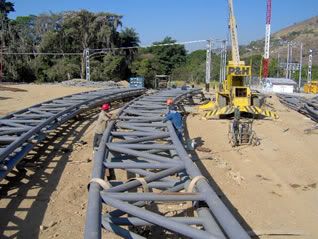
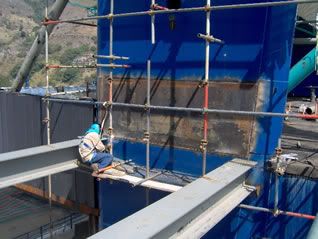



And this is what it will look like when fully completed:

Here is the stadium which they are rebuilding in Barcelona:
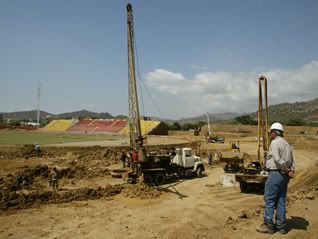
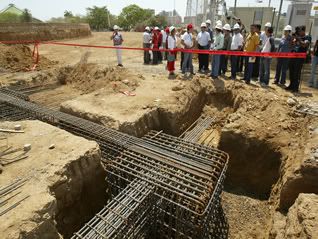
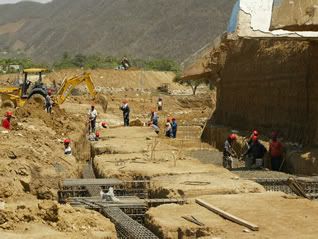
And this is what it will look like when fully completed:

Here is the new stadium in Tachira:
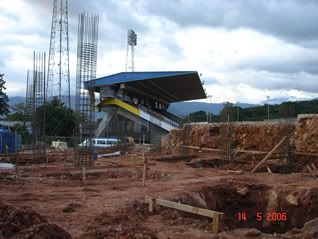
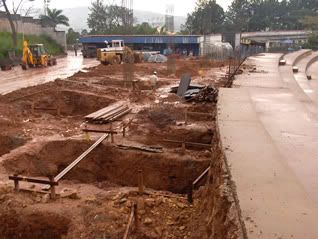
And here is what this stadium will look when complete:

Now, given that people will be coming to Venezuela from all over the continent it would be nice if they had a nice modern international airport to arrive in - something Venezuela has been lacking for many years. So the Venezuelan government finally upgraded the main airport by Caracas. Having gone through it I can confirm its a huge improvement over what was there before:
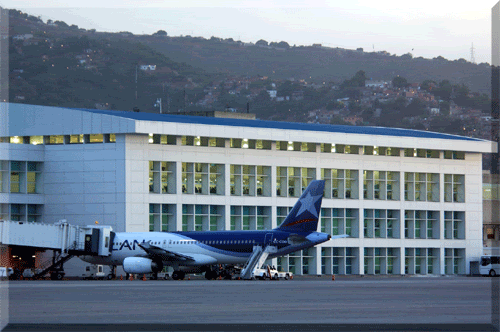


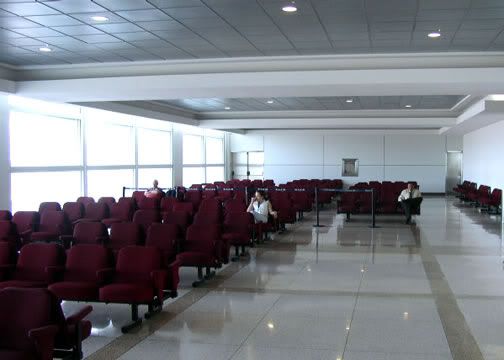
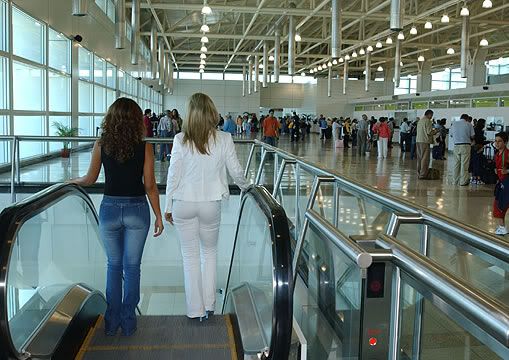
Of course, Chavez has done great things for poor and working class Venezuelans through his expansive social programs. At the same time though, the Chavez government is building a massive number of public works. Not only does this give the country things it needs and can be proud of but it also creates jobs and gives the economy a needed boost. So these pictures aren't really of soccer stadiums and airports. They are of Venezuela progressing.
|
In Merida they are building a new stadium. Here are some construction photos:





And this is what it will look like when fully completed:

Here is the stadium which they are rebuilding in Barcelona:



And this is what it will look like when fully completed:

Here is the new stadium in Tachira:


And here is what this stadium will look when complete:

Now, given that people will be coming to Venezuela from all over the continent it would be nice if they had a nice modern international airport to arrive in - something Venezuela has been lacking for many years. So the Venezuelan government finally upgraded the main airport by Caracas. Having gone through it I can confirm its a huge improvement over what was there before:





Of course, Chavez has done great things for poor and working class Venezuelans through his expansive social programs. At the same time though, the Chavez government is building a massive number of public works. Not only does this give the country things it needs and can be proud of but it also creates jobs and gives the economy a needed boost. So these pictures aren't really of soccer stadiums and airports. They are of Venezuela progressing.
|
Would they please make up their minds
The on again, off again, on again, now maybe off again opposition primaries are becoming something of a joke. Last week the opposition NGO Sumate announced they were off because the opposition candidates hasn't agreed to have them. After a fuss the opposition candidates, Petkoff, Rosales, and Borges met in Zulia and supposedly agreed to hold them.
But then in the past couple of days Primero Justicia, Borge's party, started complaining that they couldn't get an answer from Sumate as to whether or not it would hold them. Yet today, Sumate came out and said the opposition candidates still hadn't agree to primaries and gave them until 5 p.m. on Thursday to come to an agreement or forget about them.
So it appears some of these candidates are talking out of both sides of their mouths - giving press conferences telling everyone that they have agree to primaries yet telling Sumate that they are still not agreeing to participate. Looks like they don't want to participate but don't want to have the bad publicity that comes with saying they don't want to participate. Either that or they are just horribly indecisive in which case what are they doing seeking a decision making job like president for in the first place.
|
But then in the past couple of days Primero Justicia, Borge's party, started complaining that they couldn't get an answer from Sumate as to whether or not it would hold them. Yet today, Sumate came out and said the opposition candidates still hadn't agree to primaries and gave them until 5 p.m. on Thursday to come to an agreement or forget about them.
So it appears some of these candidates are talking out of both sides of their mouths - giving press conferences telling everyone that they have agree to primaries yet telling Sumate that they are still not agreeing to participate. Looks like they don't want to participate but don't want to have the bad publicity that comes with saying they don't want to participate. Either that or they are just horribly indecisive in which case what are they doing seeking a decision making job like president for in the first place.
|
Monday, July 03, 2006
Driving oil prices
Oil prices have been high for a couple of years now and don't seem to be heading down any time soon. What could be behind this? Its most likely a confluence of factors but here is a big one that was mentioned in the New York Times this past weekend:
The total miles of highway in China last year was 23,000 - more than double what existed in 2001.
In 2000 China had about 6 million passenger cars on the road - now it has 20 million.
Car sales are up 54% in the first three months of 2006 compared with the same period in 2005.
Every day a thousand new cars hit the road in Beijing.
The article wasn't about oil consumption - it was about how China is developing a car culture along the lines of the U.S. Of course this explosive growth in automobiles is what is likely to keep China's thirst for oil on an upward trajectory.
China has been growing rapidly for a couple of decades now but it is only recently that enough people are having high enough income to purchase cars. For the first two decades of growth people saw their incomes increase but they were still too poor to purchase cars. Now increasing numbers of people are passing the income threshold that allows them to buy cars. One wonders how long it will take before India passes that same threshold.
The bottom line is barring the development of an alternative to the internal combustion engine demand for oil is likely to remain strong. As long as OPEC can be at least keep supply somewhat under control prices should remain robust.
|
The total miles of highway in China last year was 23,000 - more than double what existed in 2001.
In 2000 China had about 6 million passenger cars on the road - now it has 20 million.
Car sales are up 54% in the first three months of 2006 compared with the same period in 2005.
Every day a thousand new cars hit the road in Beijing.
The article wasn't about oil consumption - it was about how China is developing a car culture along the lines of the U.S. Of course this explosive growth in automobiles is what is likely to keep China's thirst for oil on an upward trajectory.
China has been growing rapidly for a couple of decades now but it is only recently that enough people are having high enough income to purchase cars. For the first two decades of growth people saw their incomes increase but they were still too poor to purchase cars. Now increasing numbers of people are passing the income threshold that allows them to buy cars. One wonders how long it will take before India passes that same threshold.
The bottom line is barring the development of an alternative to the internal combustion engine demand for oil is likely to remain strong. As long as OPEC can be at least keep supply somewhat under control prices should remain robust.
|
Sunday, July 02, 2006
What Mexicans are voting for today
Leftist raises hopes in Mexico's forgotten towns
By Greg Brosnan
When the air reeks of sewage, rain makes your street look like a plowed field and month-long water shortages mean even bucket baths are sometimes a luxury, a flushing toilet can be a dream worth voting for.
A two hour commute from downtown Mexico City on the putrid periphery of a vast urban sprawl, many in this town of housemaids and security guards will vote for a leftist in Sunday's presidential election, hoping he will change their lives.
The slight favorite in a close race, former Mexico City mayor Andres Manuel Lopez Obrador, is counting on desperate voters in poverty traps like Chalco on the capital's forgotten fringe and across the country to help him beat Felipe Calderon of the conservative ruling party.
Lopez Obrador gave cash handouts to elderly and disabled people and single-parent families as Mexico City mayor. He has promised to spread those programs throughout Mexico while boosting incomes through welfare payments and fuel price cuts.
He also promises to make services most city dwellers take for granted available to those for long left out.
"When it rains, all the houses flood," said security guard and Chalco resident Juan Jose Lopez, 52, as he lined up to vote for Lopez Obrador in Chalco on Sunday.
He said his elderly father in Mexico City was receiving a pension thanks to the leftist, and said the candidate's humble origins made it more likely he would look out for the poor.
"He comes from below, he understands," he added.
Some already have huge expectations for a better life under Lopez Obrador.
"Our hygiene, our habits, everything would change," 32-year-old bus driver Oscar Hernandez said, sitting on a dirty sofa outside the breezeblock shack he shares with his wife, as one of his three children filled a bucket for a bath.
The older girl and boy sleep in a bunk bed above Hernandez and his wife. His three-year-old girl sleeps on a foam cushion on the floor. Hernandez's toilet feeds into a hole in the ground and a proper sewage system is his main electoral wish.
LIFE ON THE EDGE
Cobwebs of wires trail from electricity pylons into houses stealing from the grid. A lone dustman with a horse-and-cart rang a bell for rubbish in the trash-strewn street while cows graze on a field visible through an empty lot.
A couple of blocks away, Carmen Bautista, 60, shares a single room shack with her son and two grandchildren orphaned when her daughter died of anemia. A corrugated iron and plastic roof sheltered a cramped space combining kitchen and bedroom.
While she swiped at flies with a plastic swat, Bautista, a diabetic, said she wanted free medicine handouts instituted during Lopez Obrador's mayorship within the official limits of Mexico City to be available in outlying Chalco.
In the squalid Iztapalapa district nearer the city center, an ocean of half-built houses laps up the bare slopes of an extinct volcano like gray concrete lava.
Lucero Nunez, 23, rents two dingy tenement rooms with her accountant clerk husband and two baby sons. They cook on a camping grill and share a stone toilet with other families.
"He promises to raise incomes, he says it on the television," she said of Lopez Obrador. "My husband is skeptical, he says seeing is believing, but I believe him ... you can tell he's a man of the people."
But in Chalco, where politicians' promises have always come cheap, many have given up hoping altogether.
"I'm not voting for any of them," Esperanza, a 44-year-old woman who would not give her surname for fear of recrimination, said as a young boy played naked in the mud beside her shack. "They're all rats who come to steal."
|
